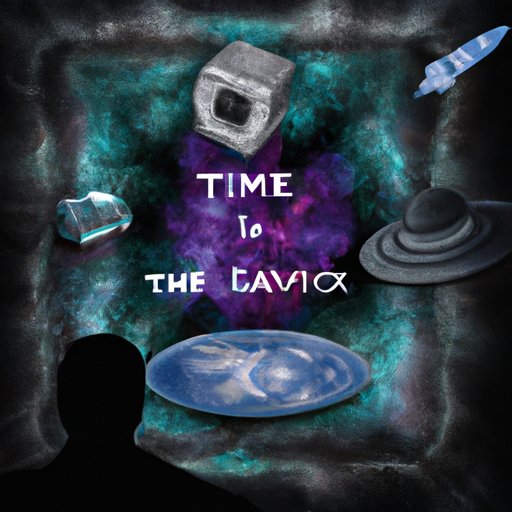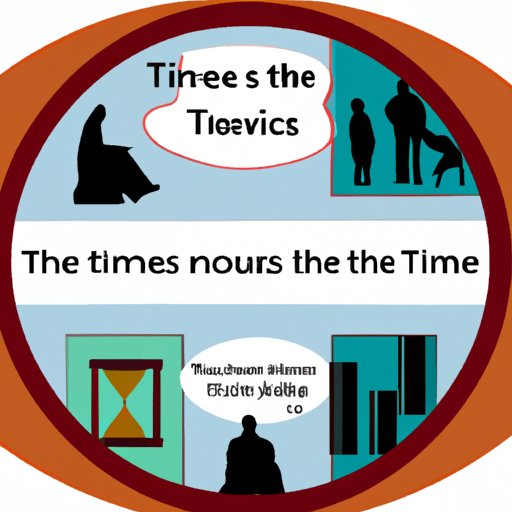Introduction
Time travel has been a staple of science fiction for decades, from H.G. Wells’ 1895 novel ‘The Time Machine’ to the blockbuster movie ‘Back to the Future’. But is it actually possible to travel through time? In this article, we will explore the scientific, philosophical, and cultural implications of time travel, examining the evidence for its feasibility and debating its ethical considerations.
Examining the Scientific Evidence for Time Travel
Since the dawn of civilization, people have speculated about the possibility of time travel. Ancient Greek philosophers such as Aristotle and Plato suggested that time was cyclical, with events repeating themselves in an endless loop. However, modern science has largely rejected this idea in favor of a linear concept of time, in which events can only move forwards.
In recent years, however, scientists have made significant strides in researching the potential of time travel. Einstein’s Theory of Relativity states that time passes more slowly in areas of strong gravity, leading some physicists to suggest that it might be possible to use this phenomenon to create a ‘time machine’ that could transport someone into the future or the past.
However, other scientists are more skeptical, arguing that time travel would require a violation of the laws of physics, such as the conservation of energy. They point out that even if time travel were possible, the technology needed to achieve it is far beyond our current capabilities.
Still, there is no denying the potential implications of time travel. If it were possible, it could revolutionize our understanding of the universe, allowing us to directly observe events from the past or observe the future before it happens.

Exploring the Philosophical Implications of Time Travel
Time travel has also prompted much debate among philosophers. Many argue that it is impossible, citing the paradoxes that could arise if one were able to alter the past. For example, what would happen if you went back in time and killed your own grandfather before he had children? This would effectively erase you from existence, creating a ‘grandfather paradox’ that cannot be resolved.
Others argue that time travel is possible, but morally wrong. They argue that tampering with the timeline could have disastrous consequences, such as creating alternate timelines or causing the universe to collapse in on itself. Still others believe that time travel is not only possible, but necessary, arguing that it could be used to prevent disasters or undo the damage caused by human error.

Investigating the Popular Culture of Time Travel
Time travel has long been a popular subject in literature, film, and television. Famous characters such as Doctor Who, Marty McFly, and Rip Hunter have all explored the possibilities of time travel, often encountering unexpected consequences along the way. These stories have captivated audiences for decades, sparking debates about the morality and feasibility of time travel.
Time travel has also been explored in more subtle ways, such as in the works of J.R.R. Tolkien and C.S. Lewis. In their stories, characters often experience a ‘slippage in time’, in which they are transported to a different era without any explanation. This type of time travel is more grounded in fantasy than science, but still offers interesting insights into how we might experience time travel in the future.
Analyzing the Theoretical Possibilities of Time Travel
Although time travel may never be possible in practice, it has nonetheless become a popular topic of theoretical discussion. Scientists have proposed several methods for achieving time travel, such as using wormholes or ‘cosmic strings’. These theories are highly speculative, and there is no guarantee that they will ever be proven correct.
Even if time travel were possible, it could have serious consequences. Some scientists have argued that traveling to the past could potentially create alternate timelines, while others worry that changing the timeline could lead to the destruction of the universe. Only time will tell if these concerns are valid.

Debating the Ethical Considerations of Time Travel
The ethical implications of time travel are also worth considering. If time travel were possible, should it be used for good or for ill? Should we try to prevent disasters, or should we let history take its course? What would be the consequences of tampering with the timeline, and who would be responsible for them?
These questions are difficult to answer, as they require us to consider both the potential benefits and risks of time travel. While it is tempting to imagine the possibilities of time travel, we must also remember that it could have devastating consequences if misused.
Conclusion
Time travel has long been a source of fascination, prompting both scientific and philosophical debate. Although it remains unclear whether time travel is possible or desirable, it has nonetheless become a popular subject in literature, film, and television. From ancient Greek philosophers to modern scientists, many have speculated about the potential implications of time travel, and only time will tell if their ideas are proved correct.
(Note: Is this article not meeting your expectations? Do you have knowledge or insights to share? Unlock new opportunities and expand your reach by joining our authors team. Click Registration to join us and share your expertise with our readers.)
